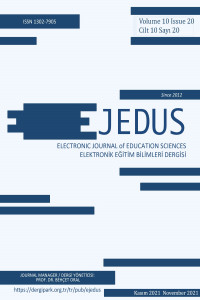Research Article
Aim & Scope
The aim of the Electronic Journal of Education Sciences (EJEDUS) is to contribute to the development of the educational sciences by giving place to national and international research on education. In addition, EJEDUS, which aims to benefit all educational stakeholders with its qualified and original studies, aims to spread the theoretical and applied academic studies towards the development of education policy and to solve the educational problems both locally and globally.
In the Electronic Journal of Education Sciences (EJEDUS), national and international studies that contribute to the educational literature, have a strong theoretical background and framework, and have a well-designed research model and analysis are included.
In this context, in addition to the information produced in various fields of educational sciences, quantitative, qualitative, mixed methodological research results and original compilation studies are published.
The topics covered in this context are the topics covered by the journal; sports education, biology education, geography education, environmental education, education and culture, democracy and human rights education, educational policy, curriculum and instruction, educational psychology, educational technology, education management, philosophy of education, science education, physics education, chemistry education , mathematics education, vocational technical education, music education, preschool education, teacher education and training, measurement and evaluation, special education, psychological counseling and guidance, health education, social studies education, sociology education, history education, Turkish education, distance education , foreign language education, lifelong learning, adult education.
Author Guidelines
Notes for Authors
1-The manuscripts submitted to the journal must not have been previously published or submitted to another journal for publication.
2 - The works submitted for publication must be prepared in accordance with the academic spelling rules and with either Turkish or English language.
3 - The publication rights of all published works belong to the journal.
4-The articles sent to the journal are published after being examined by the relevant referees.
5-Arbitrary articles by the referee or editor for the purpose of checking, but the author does not have to be sent back. However, the author can request a correction.
6-Related editor can make the spelling corrections he deems necessary.
7-Scientific studies and attachments (photos, figures, tables, etc.), must be prepared in Word 6.0 / 2003 or higher in the program Times New Roman 12 point 1 line spacing (Abstract and 10 point spacing 1 line, paragraph first line 0). Margin settings: top 2.5cm, left 2.5cm, right 2.5cm, bottom 2.5 cm, paragraph first line should be 1.25 cm from the inside, inter-paragraph range should be: before 0 nk, then 6 nk. Titles should be before 12nk, then 6nk. Blank lines should not be given between paragraphs. Table names on the top and center of the table, figures and graphics should be given at the bottom center.
8-Abstract and Keywords should be placed at the beginning of the study with approximately 150 words. In addition, the title, institution, e-mail address information for EVERY AUTHOR should be included in the article's metadata. ”ORCID ait information, which has international validity, should be included along with the contact information of all the authors in the journals. Click here for sample article template. Link for the orcid code: https://orcid.org/
9-The footnotes in the manuscripts will be prepared in the form of APA 6 (American Psychological Association) or classical footnote format. For all cited references, complete bibliographic information should be available. It is recommended to use the Latin alphabet for all references cited (this is important for the coefficient of influence of the citation).
10- The bibliography of the manuscript and the manuscript of the manuscript should be written.
11- The opinions put forward in the articles published in the journal bind the authors. All legal responsibility of the writings belongs to the authors.
12-Articles published in the journal, can be quoted with the condition of showing the source. Attributes to the journal; author, article name, Journal of Electronic Education Sciences (www.ejedus.org), skin, number, year format is recommended.
13 - No copyright fee is paid to the published articles.
14-It is recommended that scientific studies to be sent do not exceed 20 pages.
15-Author information should not be given on the first page of the article. This information should be given in the "article metadata" section.
16. In scientific studies to be sent to the journal, utmost attention should be given to compliance with research and publication ethics.
* ARTICLES NOT SUITABLE FOR THESE RULES WILL NOT BE EVALUATED.
Ethical Principles and Publication Policy
EJEDUS’a çalışma gönderen araştırmacıların etik sorumlulukları bulunmaktadır. Bu sorumluluklar aşağıdadır:
Yazarların alıntı ve referans kurallarına uygun eserler ortaya koymaları beklenmektedir.
Yazarlardan değerlendirme süreçleri çerçevesinde makalelerine ilişkin ham veri talep edilebilir, böyle bir durumda yazar(lar) beklenen veri ve bilgileri editör kuruluna sunmaya hazır olmalıdır.
Yazarlar kullanılan verilerin kullanım haklarına, gerekli izinlere (araştırma, etik vs.) sahip olmalıdır.
Yazarlar çalışmalarını süreci tamamlanmadan birden fazla dergiye yükleyemez. Başka bir dergide yayınlanmış çalışma dergimize gönderilemez.
Değerlendirme süreci başlamış bir çalışmanın yazar sorumluluklarında değişiklik (yazar ekleme, yazar sırası değiştirme, yazar çıkartma gibi) teklif edilemez.
Kişisel Verilerin Korunması
Editörler; değerlendirilen çalışmalarda yer alan katılımcılara veya görsellere ilişkin kişisel verilerin korunmasını sağlamakla sorumludur. Editör kurulu; dergide yer alan yazar, hakem ve okuyucuların bireysel verilerini korumakla sorumludur.
Hakemlerin Etik Sorumlulukları
Dergi politikamız gereği tüm çalışmaların "kör hakemlik” ile değerlendirilmesi yayın kalitesini doğrudan etkilediğine inanmaktayız. Bu süreç yayının dergimizin işlem süreçlerindeki güvenirliğini garanti edecektir. Dergimizde değerlendirme süreci çift-kör hakemlik ilkesiyle yürütülmektedir. Hakemler yazarlar ile doğrudan iletişime geçemez, değerlendirme ve yorumlar dergi yönetim sistemi aracılığıyla iletilir. Bu süreçte değerlendirme formları ve tam metinler üzerindeki hakem değerlendirmeleri editör aracılığıyla yazar(lar)a iletilir.
Etik Olmayan Bir Durumla Karşılaşırsanız
Yukarıda bahsedilen etik sorumluluklar ve dışında etik olmayan bir davranış veya içerikle karşılaşırsanız lütfen oralbehcet@gmail.com adresine e-posta yoluyla bildiriniz.
Indexes
Journal Boards
Editor in Chief

Editor Board




PDR Alan Editörü
Temel Eğitim Alan Editörü








![Akademik Dokümanlar Dizini (Index of Academic Documents [IAD])](https://dergipark.org.tr/media/cache/journal_index_logo/598f/847c/f762/63b07235cf254.png)


